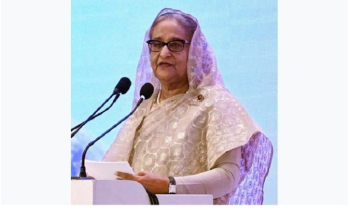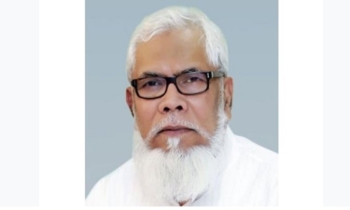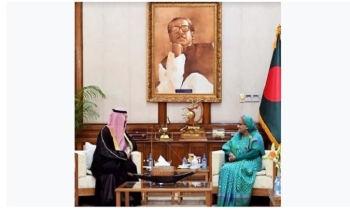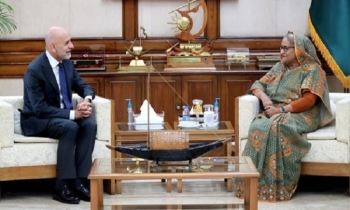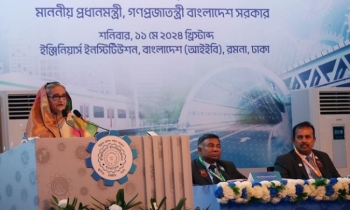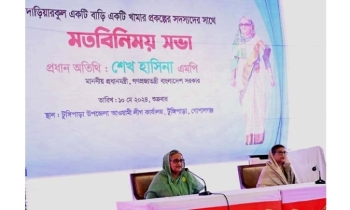Exclusive interview of outgoing Algerian Ambassador Rabah Larbi
BI Report || BusinessInsider
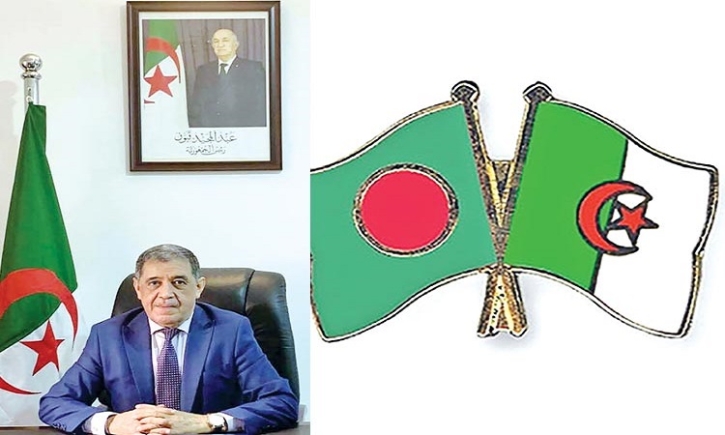
Photo: Courtesy
Democratic Republic of Algeria established diplomatic relations with independent Bangladesh. This decision was made in March of the same year, following the conclusion of a visit by a Bangladeshi delegation to Algeria. Our two countries are connected by shared bonds of religion, culture, and friendship. Additionally, we both uphold a dedication to human freedom and democratic principles.
However, outgoing Algerian Envoy Rabah Larbi reiterated our sincere ties before departing Bangladesh. He discussed a range of topics spanning from our bilateral relations to conflicts in the Middle East and even touched upon the emergence of a new world order. He shared his opinions and outlooks during an interview with the Business Insider Bangladesh.
Business Insider: How has your professional and personal experience been in Bangladesh over the past four and a half years?
Rabah Larbi: Not exactly that long a duration. It was just a few weeks after presenting my credentials in February 2020, the Covid-19 pandemic broke out in Bangladesh. Consequently, for almost two years, my mission was accomplished under the constraints of the pandemic. I would like here to salute the performance of Bangladesh, a country of more than 170 million inhabitants, which does not yet have the means of developed countries and which has managed this pandemic with rare dexterity and a lot of foresight under the leadership of the honorable Prime Minister Sheikh Hasina.
To return to your question about my professional and personal experience in Bangladesh, I would like to say that over 42 years of diplomatic career including 5 years spent at the Presidency of the Republic from 2001 to 2005 as Director of studies, my experience has been further enriched in professional and personal terms if only by the fact that Bangladesh is the first Asian country in which I have served.
Business Insider: How do you assess the state of Bangladesh-Algeria relations, and what do you consider your most significant achievement as the Algerian Ambassador to Bangladesh?
Rabah Larbi: Relations between my country and Bangladesh have historically been excellent. The cordiality between the two countries is evident in the mutual respect and active solidarity exchanged between the late Presidents Houari Boumediene and Sheikh Mujibur Rahman.
However, while this deep historical connection is significant, there is still ample room for further development on economic, commercial, cultural, and other levels, given the hidden potentials of our two countries.
I consider my greatest achievement as the Algerian Ambassador to Bangladesh to be the reopening of our Embassy in Bangladesh after approximately three decades of closure. Additionally, I take satisfaction in having familiarized the local staff working at the Embassy with the intricacies of diplomatic affairs.
Business Insider: What professional obstacles and challenges have you faced in Bangladesh?
Rabah Larbi: Firstly, I understood that the Covid-19 pandemic has been a significant challenge. Secondly, there have been imponderables that I cannot fully explain. Despite my efforts in collaborating with the Bangladeshi side on the preparation of more than 20 bilateral cooperation projects in anticipation of the official visit of PM Sheikh Hasina to Algeria, at the invitation of President Abdelmadjid Tebboune, this visit has yet to materialize.
Business Insider: What are some potential sectors that both countries can explore to elevate our bilateral ties to the next level?
Rabah Larbi: There are many sectors in our two countries where we can explore to elevate our bilateral cooperation to a higher level. For instance, Bangladesh has a keen interest in the energy sector, where Algeria possesses significant expertise, while Algeria is interested in the textile sector, where Bangladesh holds rich knowledge.
During the gradual subsiding of the Covid-19 pandemic, I engaged in several video conferences with Ministers of the Government of Bangladesh, including the honorable Minister of State for Energy, Nasrul Hamid. During these discussions, Hamid expressed the Bangladesh government's desire to establish cooperation with Algeria in the field of energy. I proposed the formation of a bilateral working group tasked with exploring the possibilities for cooperation between our two countries in energy matters. Subsequently, both sides endorsed my proposal. Although this working group exists today, it has not convened as of yet.
Business Insider: There is a lack of people-to-people connectivity between Bangladesh and Algeria. How can we jointly address the issue?
Rabah Larbi: Among other reasons for satisfaction while I am leaving Bangladesh, are the twenty draft agreements and MoUs that our two countries have exchanged to strengthen and diversify our bilateral cooperation, and most of which are ready to be signed. Some are directly related to the mobility of people such as a draft agreement on cultural exchanges, the draft agreement on the abolition of diplomatic visas, or the draft of an agreement on the exchange of training for diplomats. Also recently, my country made a response to the Bangladeshi side regarding its proposal for cooperation in civil aviation.
A few days ago, the Ambassador of Bangladesh in Algeria was interviewed by the Algerian newspaper El Chourouk. Also, he mentioned, among other things, the possibility of opening an Algiers-Dhaka airline route at a time that would be predictable. Introducing such a direct airline route is likely to facilitate human ties between our two countries. The Embassy visas department has already started issuing work visas to Bangladeshi workers and technicians whose services are requested by foreign companies operating in Algeria which is currently witnessing an acceleration in its development.
Business Insider: Shifting to growing regional conflicts in the Middle East - what do you think is the main cause behind the prolonged military conflict between Israel and Hamas in the Middle East?
Rabah Larbi: The main cause of the prolonged military conflict between the Zionist entity and the Palestinian resistance is the colonization of Palestine by this entity for several decades.
Business Insider: Why did OIC not play a conclusive and significant role in putting an end to the Israel-Hamas conflict?
Rabah Larbi: The OIC of which Algeria and Bangladesh are members has tried and is still trying to play a role in resolving the prevailing Israeli-Palestinian crisis but it failed. The observation is also the same about the Arab League. This organisation needs significant reforms within it, which my country has continually called for.
Business Insider: What is your opinion about the recent missile strike on Israel by Iran? Do you think this attack will strengthen Iran’s position within the Arab World?
Rabah Larbi: The recent Iranian strikes against the Zionist entity military installations were very entirely expected. They come in response to the attacks by the Zionist entity perpetrated against the Iranian Consulate in Syria, which my country has strongly condemned. Zionist aggression against a portion of Iranian territory abroad protected by the Vienna Convention on Diplomatic Relations constitutes a flagrant breach of international law and the principles governing international relations as they were conceived by the Westphalia system, which, moreover, is more or less respected by its creators.
The Zionist entity with its current government is draining humanity into the unknown. Fortunately, there are even Western countries, objective international observers, and knowledgeable diplomats who oppose the Zionist drift. Likewise, men and women with awakened human conscience continue to demonstrate in the four corners of the world against the genocidal acts of the Zionist entity. Who was not shocked, throughout the world, by the act of the young American Aaron Bushnell who killed himself living in front of the embassy of the Zionist entity in Washington?
return to another aspect of your response, namely whether or not the Iranian reaction will strengthen the Iranians' position with the Arab world, I do not refrain from thinking that the yes largely wins if you think of the Arab people.
Business Insider: Algeria has recently hosted the 7th edition of the GECF (Gas Exporting Countries Forum) Summit. Can Bangladesh benefit from the GECF in any way, if yes, then how?
Rabah Larbi: I believe I have provided some clarifications on the meaning and scope of the Algiers Declaration produced at the end of the 7th GECF in the columns of your newspaper. I would like to thank your daily newspaper for allowing me to present my point of view on the results of this Forum which brought together in Algeria, last month, several Heads of State and Government from gas-producing countries and which benefited from significant national and international media coverage, including from your newspaper which you represented so well in Algiers. You are asking me questions of how your country can benefit from the GECF.
It all depends on what Bangladesh wants. Your country will soon begin off-shore gas exploration. Suppose it becomes a major gas producer in the future. In that case, it will have the latitude to join the GECF to defend its interests within this Forum as new ones like Senegal, Mauritania and Mozambique have recently done. The next energy explorations will be conclusive for Bangladesh, especially since it seems that the first exploratory indications would be far from negligible.
Business Insider: What is your opinion on the changing world order?
Rabah Larbi: The beginnings of demands for a new, fairer world order date back, roughly speaking, to the Bandung Summit in 1955. We also remember that during the 1950s, a French sociologist (Alfred Sauvy) put forward the idea of the third world which refers to the developing countries of the South about the two existing worlds at the time, the Western camp and the communist camp.
My country hosted the 4thNon-Aligned Summit in 1973, in which great leaders from the South took part, including the Father of the Nation, Bangabandhu Sheikh Mujibur Rahman, who took the initiative to ask, on behalf of the non-aligned countries, a special session of the United Nations General Assembly to discuss a new world economic order, which took place in 1974. This idea of a new, fairer world economic order remains valid today. Algerian President Abdelmadjid Tebboune re-launched it just some time ago, during his participation in a virtual BRICS meeting, to which he was invited.
It turns out that the BRICS group (and this is my personal opinion which only commits me) seems to have taken, while held in South Africa, a non-strategic trajectory losing a little of its prestige and by saying this I unfortunately risk further distorting this notion of prestige.
To return to the demand for a new world order made by Algeria in 1974, there has been, to my knowledge, only a north-south summit which was held in CANCUN, Mexico, in 1981. This Summit which was to plead in favour of <> between the countries of the North and the South did not succeed. In one of the volumes of his Verbatim, Jacques Attali refers to it.
Today, our world is in the process of being rebuilt and is currently experiencing at least two tragedies, the armed conflict in Ukraine and the genocide currently being perpetrated against the Palestinian people.
For the foreseeable future, new emerging countries like Algeria (10 in the world by area and possessing enormous human and natural resources, which I predict will be in the top 20 most powerful countries in the world at most at generation) and Bangladesh (3rd Muslim country by demographics and soon to be 25thworld economy) will certainly have their say.
The enduring historical relationship based on respect and active solidarity between Algeria and Bangladesh will continue to serve as a strong foundation for their bilateral ties.
This mutual respect and solidarity have fostered a sense of shared values between the two nations, laying the groundwork for cooperation and collaboration across various issues.
As both countries navigate the complexities of the contemporary world, this historical relationship will remain a guiding principle, strengthening their bond and facilitating meaningful engagement on regional and global issues, he said in his concluding remarks.
Courtesy: Daily Observer

